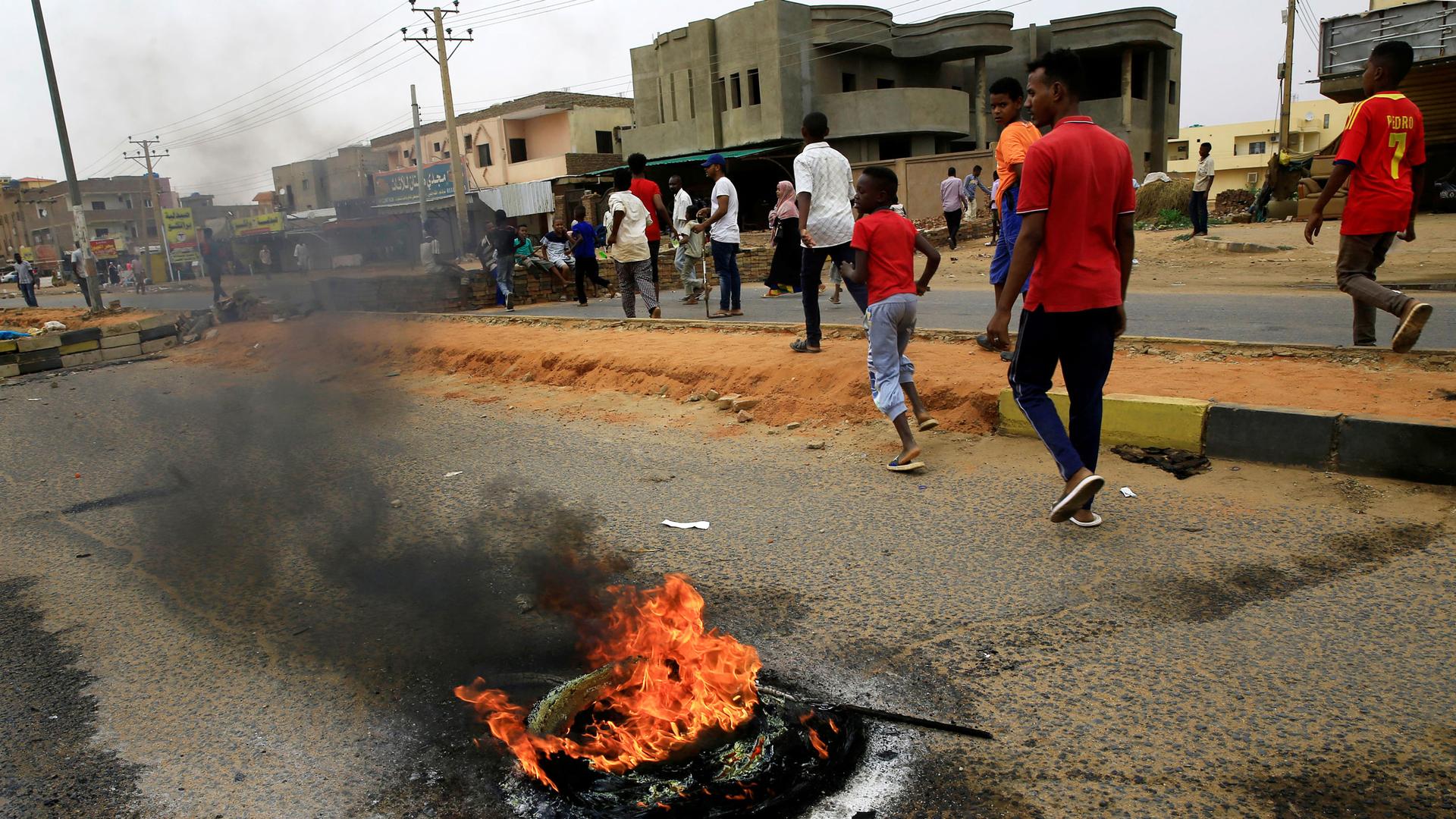Sudanese protesters walk past burning tires used to erect a barricade on a street, in Khartoum, Sudan, June 4, 2019.
A day after the worst bout of violence where at least 35 people were killed in Sudan, the opposition on Tuesday rejected a plan by its military rulers to hold elections within nine months.
Sudanese security forces stormed a protest camp outside the Defense Ministry on Monday in central Khartoum, according to doctors linked to the opposition.
The military council that has ruled since Bashir’s overthrow afterward canceled all agreements with the main opposition alliance.
But Madani Abbas Madani, a leader of the Declaration of Freedom and Change Forces (DFCF) opposition alliance, said an open-ended civil disobedience campaign would continue to try to force the council from power.
The opposition rejected all that Transitional Military Council (TMC) Head Lieutenant General Abdel Fattah al-Burhan said in his statement, Madani told Reuters.
“What happened, killing protesters, wounding and humiliation, was a systematic and planned matter to impose repression on the Sudanese people,” he said.
The atmosphere in the capital Khartoum was very tense on Tuesday as many roads were barricaded by protesters, many shops were shut and streets were mostly empty. Security forces were trying to clear the barricades, a Reuters witness said.
Rapid Support Forces vehicles were patrolling the streets in Omdurman, on the other side of the River Nile from Khartoum, and firing into the air.
The leaders of protests that forced Bashir from power after three decades of authoritarian rule in April have demanded preparations for elections during a transitional period led by a civilian administration.
The military council has also been under both domestic and international pressure to hand over power to civilians. It had agreed to a three-year transition period with the DFCF.
Rick of escalation
The main protest organizers, the Sudanese Professionals Association (SPA), accused the security forces of perpetrating “a massacre” when they raided the camp amid heavy gunfire.
Council spokesman Lieutenant General Shams El Din Kabbashi denied this and said security forces were pursuing “unruly elements” who had fled to the protest site and caused chaos.
Sudan has been rocked by unrest since December, when anger over rising bread prices and cash shortages broke into sustained protests that culminated in the armed forces ousting Bashir.
But talks between a coalition of protesters and opposition parties ground to a halt amid deep differences over who will lead a transition to democracy that both sides had agreed will last for three years.
In a televised address in the early hours of Tuesday morning, council leader Burhan said the opposition coalition was equally responsible for the delay in coming to a final agreement.
The council had decided to cancel all agreements with the protest groups and called for elections within nine months, which he said will be organized under regional and international supervision.
“Gaining legitimacy and a mandate does not come but through the ballot box,” Burhan said.
He also announced that a government would immediately be formed to run the country until elections are held.
Burhan also said he regretted the violence and it would be investigated.
The security forces’ operation drew condemnation from Europe, the United States and the African Union.
UN spokesman Stephane Dujarric said it was clear they had used excessive force on civilians, while British Foreign Minister Jeremy Hunt called the dispersal “outrageous.”
The European Union urged a speedy transfer of power to civilians. Neighboring Egypt called for “calm and restraint,” while the United Arab Emirates (UAE) said it hoped that dialogue would prevail in Sudan.
The Soufan Group, a security and intelligence think-tank, warned that the situation could escalate swiftly to more violence.
“There are clear parallels to some of the Arab Spring protests that eventually progressed to full-blown insurgencies, including Syria, where indiscriminate shelling of civilians by the military initially galvanized protest movements that helped launch a broader uprising,” it said in an analysis.
“There is a real risk that the situation could spiral into full-blown civil war, which would significantly affect the region, with spillover violence impacting the ongoing conflict in Libya.”
However, Hamid Eltgani Ali, a professor at the American University in Cairo, predicted that the protest movement would succeed in forcing the military to step down. There were two competing visions for Sudan’s future, he told Reuters.
“The vision of hate and division is led by the Janjaweed (militias) and military resisting to preserve their economic interests they enjoyed during Bashir’s rule, while the vision of hope is led by professional associations and syndicates. They want a democratic, open Sudan with a strong developmental vision,” Ali said.
Sudan has been on a US list of states that sponsor terrorism since 1993 that denies the country access to financial markets and strangles its economy.
Washington lifted a 20-year trade embargo against Sudan in 2017 and was in discussions to remove it from the sponsor of terrorism list when the military stepped in to depose Bashir.
By Khalid Abdelaziz/Reuters
Reporting by Ali Abdelaty, Nadine Awadalla, and Yousef Saba, Editing by Angus MacSwan.
